Following is a brief synopsis of each session and sermon preached during the week. The full audio for these messages is available by clicking here.
Meeting The Man
by Bill Wingard
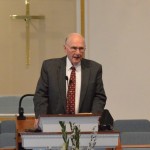 Regardless of the situation we face, we can rejoice when we take time to meet with The Man, Jesus Christ. Countless examples in Scripture illustrate this for us. Abraham met Melchizedek just before he was tempted to accept gifts from pagan kings, and thus was strengthened to resist temptation. Jacob’s wrestling match with The Angel of God prepared him to face the consequences of his prior relationship with Esau. Moses’s meeting at the burning bush gave him the grace he needed to deal with problems in his own family, so he could be ready to lead the nation of Israel. Joshua’s meeting with the Captain of the hosts of the Lord prepared him to lead the attack on their enemies. When all hope seemed gone, Mary Magdelene was encouraged to meet The Man in the garden. Two men on the road to Emmaus met The Man, and heard the greatest Bible lesson of all time. Saul met Him on the road to Damascus, and was called into service. We today can meet with Him, and will be forever changed when we spend time with our Lord.
Regardless of the situation we face, we can rejoice when we take time to meet with The Man, Jesus Christ. Countless examples in Scripture illustrate this for us. Abraham met Melchizedek just before he was tempted to accept gifts from pagan kings, and thus was strengthened to resist temptation. Jacob’s wrestling match with The Angel of God prepared him to face the consequences of his prior relationship with Esau. Moses’s meeting at the burning bush gave him the grace he needed to deal with problems in his own family, so he could be ready to lead the nation of Israel. Joshua’s meeting with the Captain of the hosts of the Lord prepared him to lead the attack on their enemies. When all hope seemed gone, Mary Magdelene was encouraged to meet The Man in the garden. Two men on the road to Emmaus met The Man, and heard the greatest Bible lesson of all time. Saul met Him on the road to Damascus, and was called into service. We today can meet with Him, and will be forever changed when we spend time with our Lord.
Download Audio
Choosing Joy When We Are Lonely
by David Fulp
 Habakkuk began his book by sharing his concern for his people. The condition of the culture made him cry out for revival. He then described Judah’s disobedience, which began with the leaders. Just as Elijah felt all alone, so did Habakkuk. When we feel alone we must remember that God has not left us. The Lord’s counsel to Habakkuk was to remind him that He was at work. Although God was not obligated to explain Himself, He did assure Habakkuk that He was not aloof to the situation. We too can take joy in knowing that God has a plan and has not forgotten us in the midst of our situation.
Habakkuk began his book by sharing his concern for his people. The condition of the culture made him cry out for revival. He then described Judah’s disobedience, which began with the leaders. Just as Elijah felt all alone, so did Habakkuk. When we feel alone we must remember that God has not left us. The Lord’s counsel to Habakkuk was to remind him that He was at work. Although God was not obligated to explain Himself, He did assure Habakkuk that He was not aloof to the situation. We too can take joy in knowing that God has a plan and has not forgotten us in the midst of our situation.
Download Audio
Choosing Joy When Men Are Cruel
by Jeremy Kobernat
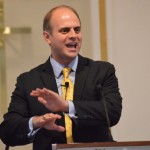 Why are people cruel? Perhaps we deserve it. If there is truth to their criticism, we must be willing to change and make things right. In Habakkuk’s case, Judah deserved the cruelty they were facing. Perhaps the attacker is deceived, discouraged, or backslidden. In that case, we must respond gently with the Spirit’s leading. It may be that the devil is attacking us, and we must stand firm. Maybe the Lord is using our attacker to draw us closer to Him. What choices do we have in our response? We could choose revenge or retaliation. We should return good for evil. We must rejoice in the indication that if we are being opposed, we may be doing something right. We should remember that God has promised a reward for those who suffer, and as a result of this we will one day have a crown to cast at His feet.
Why are people cruel? Perhaps we deserve it. If there is truth to their criticism, we must be willing to change and make things right. In Habakkuk’s case, Judah deserved the cruelty they were facing. Perhaps the attacker is deceived, discouraged, or backslidden. In that case, we must respond gently with the Spirit’s leading. It may be that the devil is attacking us, and we must stand firm. Maybe the Lord is using our attacker to draw us closer to Him. What choices do we have in our response? We could choose revenge or retaliation. We should return good for evil. We must rejoice in the indication that if we are being opposed, we may be doing something right. We should remember that God has promised a reward for those who suffer, and as a result of this we will one day have a crown to cast at His feet.
Download Audio
Choosing to Rejoice and Sing
by Tim Daniel
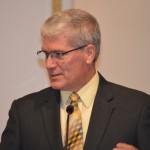 Habakkuk chapter three is a prayer hymn of victory and excitement. We must choose to rejoice and sing because God is with us. That alone is cause for excitement! He will remember us and revive us, as David plead in Psalm 59 and 85. We can sing because of God’s character. He is glorious in his coming, deliverance, diety, and in our difficulties. The difficulties we face do not diminish His glory. He is eternal. He is just. We can rejoice because God is in control. He split the Red Sea for the Israelites. He can do things for you that He’s never done for anyone else. We can sing because there is a cause. God’s cause is the salvation of His people. Our cause is to lead people to the One Who can deliver them.
Habakkuk chapter three is a prayer hymn of victory and excitement. We must choose to rejoice and sing because God is with us. That alone is cause for excitement! He will remember us and revive us, as David plead in Psalm 59 and 85. We can sing because of God’s character. He is glorious in his coming, deliverance, diety, and in our difficulties. The difficulties we face do not diminish His glory. He is eternal. He is just. We can rejoice because God is in control. He split the Red Sea for the Israelites. He can do things for you that He’s never done for anyone else. We can sing because there is a cause. God’s cause is the salvation of His people. Our cause is to lead people to the One Who can deliver them.
Download Audio
Resolving to Rejoice
by Russ Bell
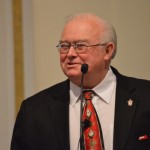 God’s revelation causes trusting. As Habakkuk looked around, he saw nothing in which to trust. Figs were a sign of health, but were not blossoming. Vines were a symbol of emotions, which were discouraged. Olives represent the Spirit of the Lord, which seemed to be lacking in Israel. The fields were bare of laborers, and the flocks were not producing. Yet he chose to rejoice because he could trust God. God’s revelation also causes triumph. Habakkuk stated, “I will joy.” This word is defined as “to spin around under the influence of violent motion.” We will never truly enjoy our salvation until we have laid down our dignity, and resolved to truly joy in God alone.
God’s revelation causes trusting. As Habakkuk looked around, he saw nothing in which to trust. Figs were a sign of health, but were not blossoming. Vines were a symbol of emotions, which were discouraged. Olives represent the Spirit of the Lord, which seemed to be lacking in Israel. The fields were bare of laborers, and the flocks were not producing. Yet he chose to rejoice because he could trust God. God’s revelation also causes triumph. Habakkuk stated, “I will joy.” This word is defined as “to spin around under the influence of violent motion.” We will never truly enjoy our salvation until we have laid down our dignity, and resolved to truly joy in God alone.
Download Audio
Enjoying the High Ground
by Barry Goodman
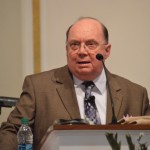 Joy is an authoritative command, and gives the avenue to contentment. Joy is derived by divine assessment. We must be sure we have the right assessment of our God. Joy demands a deliberate action. We must make up our mind to be joyful, and then work at it. Part of those actions may be determining who we will spend time with so as not to be robbed of our joy. Joy delivers a delightful accomplishment. God has made the high places, but Habakkuk claims the high place as his very own; we can do the same. The state of joy is in the mind of God. He has prepared a table for us, created still waters, and makes us to rest. He desires that joy will remain in us, and that our joy will be full.
Joy is an authoritative command, and gives the avenue to contentment. Joy is derived by divine assessment. We must be sure we have the right assessment of our God. Joy demands a deliberate action. We must make up our mind to be joyful, and then work at it. Part of those actions may be determining who we will spend time with so as not to be robbed of our joy. Joy delivers a delightful accomplishment. God has made the high places, but Habakkuk claims the high place as his very own; we can do the same. The state of joy is in the mind of God. He has prepared a table for us, created still waters, and makes us to rest. He desires that joy will remain in us, and that our joy will be full.
Download Audio
Rejoicing in the Future
by Danny Whetstone
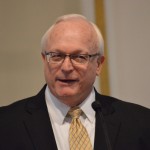 Ezra recorded the events surrounding the Jew’s return to the land. As they gathered in Jerusalem, establishing the altar was a priority. Could it be some of our problems today come from failing to set our altars of prayer in order? The next task was to lay the foundation. This brought great rejoicing, as well as great weeping. The joy of great successes should bring great joy to our hearts. The young men looked forward in excitement; the older men looked back in remembrance. At each end of the spectrum, they understood the perspective of the other. The only hope an older generation has of seeing beyond their own finish line, is to look into the hearts of younger men and realize that tomorrow is in good hands. Young men must be willing to dream big dreams, and then realize that the greatest goal they can fathom is smaller than what God can accomplish through them. He desires to do “exceedingly abundantly above all that we ask or think.”
Ezra recorded the events surrounding the Jew’s return to the land. As they gathered in Jerusalem, establishing the altar was a priority. Could it be some of our problems today come from failing to set our altars of prayer in order? The next task was to lay the foundation. This brought great rejoicing, as well as great weeping. The joy of great successes should bring great joy to our hearts. The young men looked forward in excitement; the older men looked back in remembrance. At each end of the spectrum, they understood the perspective of the other. The only hope an older generation has of seeing beyond their own finish line, is to look into the hearts of younger men and realize that tomorrow is in good hands. Young men must be willing to dream big dreams, and then realize that the greatest goal they can fathom is smaller than what God can accomplish through them. He desires to do “exceedingly abundantly above all that we ask or think.”
Download Audio
The Pleading Heart
by John O’Malley
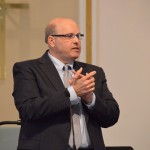 David is a study in contrasts. He was a man after God’s heart, yet committed adultery. He was a strong warrior, yet a gentle poet. In a moment of victory he killed Goliath, yet in a moment of weakness he had Uriah killed. Life can be overwhelming. What matters is your strategy for how to respond. In Psalm 61 we have an example of David’s response. He plead for God to listen to him. He plead for God to lead him. Though a leader himself, he realized that he needed a helper to take him by the hand and the heart in a moment of hopelessness. He needed to be taken to a higher place, by a Higher Person. He plead for God to look out for him. David also promised to abide with God, in the place of hope and help. We must realize that the path on which God has placed us is the path on which we need to be, and learn to respond with rejoicing.
David is a study in contrasts. He was a man after God’s heart, yet committed adultery. He was a strong warrior, yet a gentle poet. In a moment of victory he killed Goliath, yet in a moment of weakness he had Uriah killed. Life can be overwhelming. What matters is your strategy for how to respond. In Psalm 61 we have an example of David’s response. He plead for God to listen to him. He plead for God to lead him. Though a leader himself, he realized that he needed a helper to take him by the hand and the heart in a moment of hopelessness. He needed to be taken to a higher place, by a Higher Person. He plead for God to look out for him. David also promised to abide with God, in the place of hope and help. We must realize that the path on which God has placed us is the path on which we need to be, and learn to respond with rejoicing.
No audio available for this session.
Awake!
by Byron Foxx
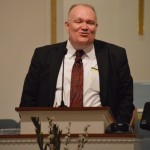 In I Thessalonians 5, Paul admonished the believers, “Let us not sleep, as do others; but let us watch . . .” It is not good for the church to be asleep on the job. One who is asleep is inactive, has no insight, and is insensitive to what is happening around them. God has designed us to rise to the challenge. We must have an awakening in our singing, giving, Bible reading, and praying, in order to experience revival.
In I Thessalonians 5, Paul admonished the believers, “Let us not sleep, as do others; but let us watch . . .” It is not good for the church to be asleep on the job. One who is asleep is inactive, has no insight, and is insensitive to what is happening around them. God has designed us to rise to the challenge. We must have an awakening in our singing, giving, Bible reading, and praying, in order to experience revival.
Download Audio
Almighty God
by Chad Estep
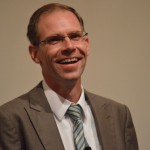 We know that God is omnipotent; but we must move beyond recognizing this as a theological fact, and apply it in our life. He has power over creation. Think what it would have been like to watch Him create the world! He has power over Satan, yet allows Satan to interact with us lest we should be exalted above measure. He has power over mankind, which is manifested in the gospel. The joy of knowing an omnipotent God allows us to triumph over temptation, trust in God, and thank God. We must sing the mighty power of our God!
We know that God is omnipotent; but we must move beyond recognizing this as a theological fact, and apply it in our life. He has power over creation. Think what it would have been like to watch Him create the world! He has power over Satan, yet allows Satan to interact with us lest we should be exalted above measure. He has power over mankind, which is manifested in the gospel. The joy of knowing an omnipotent God allows us to triumph over temptation, trust in God, and thank God. We must sing the mighty power of our God!
Download Audio
Oh Worship the Lord!
by Michael West
 When we consider the greatness, wonder, goodness, and power of God, the only thing left to do is learn to worship Him, because He is worthy! He seeks for us to worship Him in spirit and in truth, and He has given us the reasons to do what He longs for us to do. Worship involves adoration. We cannot truly worship until we are still and learn to think about God. Worship is manifested in our actions. Throughout the Scriptures, worship involved active individual participation. Too often today we have false ideas that worship is a passive observation rather than active participation, and that corporate worship is isolated from our personal worship. In reality, corporate worship is the combined overflow of our individual worship. True worship must be acceptable to God. When we worship as He wants, He will use it to bless and encourage those around us.
When we consider the greatness, wonder, goodness, and power of God, the only thing left to do is learn to worship Him, because He is worthy! He seeks for us to worship Him in spirit and in truth, and He has given us the reasons to do what He longs for us to do. Worship involves adoration. We cannot truly worship until we are still and learn to think about God. Worship is manifested in our actions. Throughout the Scriptures, worship involved active individual participation. Too often today we have false ideas that worship is a passive observation rather than active participation, and that corporate worship is isolated from our personal worship. In reality, corporate worship is the combined overflow of our individual worship. True worship must be acceptable to God. When we worship as He wants, He will use it to bless and encourage those around us.
Download Audio
 “And David said, Whosoever smiteth the Jebusites first shall be chief and captain. So Joab the son of Zeruiah went first up, and was chief . . . Do thou therefore according to thy wisdom, and let not his hoar head go down to the grave in peace. (1 Chr 11:6/1 Kings 2:6)
“And David said, Whosoever smiteth the Jebusites first shall be chief and captain. So Joab the son of Zeruiah went first up, and was chief . . . Do thou therefore according to thy wisdom, and let not his hoar head go down to the grave in peace. (1 Chr 11:6/1 Kings 2:6)
 We are enjoying having Kaitlyn Haye as an intern in the Office this summer! Kaitlyn grew up in a ministry family. She is a student at Ambassador Baptist College, where she is majoring in Church Ministries. She and her husband, Drew, were married in May of this year. They are members of the Crossroads Baptist Church of Columbus, NC, with Pastor Nathan Deatrick. Upon completion of her schooling in December, they plan to pursue a ministry in evangelism.
We are enjoying having Kaitlyn Haye as an intern in the Office this summer! Kaitlyn grew up in a ministry family. She is a student at Ambassador Baptist College, where she is majoring in Church Ministries. She and her husband, Drew, were married in May of this year. They are members of the Crossroads Baptist Church of Columbus, NC, with Pastor Nathan Deatrick. Upon completion of her schooling in December, they plan to pursue a ministry in evangelism. Stephen and Charity Jenney have joined the World Wide family. The Jenneys are sent out of Shalom Baptist Church in North Tonawanda, NY. Charity’s father, Roland Mills, is their pastor. The Jenneys are both graduates of Ambassador Baptist College. Their plans are to begin deputation to plant churches in Arizona. Their son Judson is one, and they are expecting another baby early next year. Please be in prayer for them as they begin this new ministry.
Stephen and Charity Jenney have joined the World Wide family. The Jenneys are sent out of Shalom Baptist Church in North Tonawanda, NY. Charity’s father, Roland Mills, is their pastor. The Jenneys are both graduates of Ambassador Baptist College. Their plans are to begin deputation to plant churches in Arizona. Their son Judson is one, and they are expecting another baby early next year. Please be in prayer for them as they begin this new ministry.
 Congratulations to John and Sarah on the birth of their first child, John Gabriel, on July 28. He was 20 inches long and weighed 7 pounds 6.3 ounces. Everyone is doing well! Keep them in prayer as they are finishing deputation and preparing to leave for the field soon.
Congratulations to John and Sarah on the birth of their first child, John Gabriel, on July 28. He was 20 inches long and weighed 7 pounds 6.3 ounces. Everyone is doing well! Keep them in prayer as they are finishing deputation and preparing to leave for the field soon.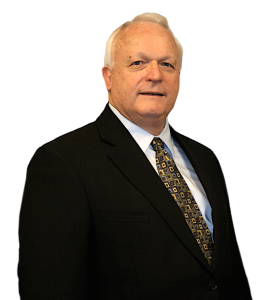
 Regardless of the situation we face, we can rejoice when we take time to meet with The Man, Jesus Christ. Countless examples in Scripture illustrate this for us. Abraham met Melchizedek just before he was tempted to accept gifts from pagan kings, and thus was strengthened to resist temptation. Jacob’s wrestling match with The Angel of God prepared him to face the consequences of his prior relationship with Esau. Moses’s meeting at the burning bush gave him the grace he needed to deal with problems in his own family, so he could be ready to lead the nation of Israel. Joshua’s meeting with the Captain of the hosts of the Lord prepared him to lead the attack on their enemies. When all hope seemed gone, Mary Magdelene was encouraged to meet The Man in the garden. Two men on the road to Emmaus met The Man, and heard the greatest Bible lesson of all time. Saul met Him on the road to Damascus, and was called into service. We today can meet with Him, and will be forever changed when we spend time with our Lord.
Regardless of the situation we face, we can rejoice when we take time to meet with The Man, Jesus Christ. Countless examples in Scripture illustrate this for us. Abraham met Melchizedek just before he was tempted to accept gifts from pagan kings, and thus was strengthened to resist temptation. Jacob’s wrestling match with The Angel of God prepared him to face the consequences of his prior relationship with Esau. Moses’s meeting at the burning bush gave him the grace he needed to deal with problems in his own family, so he could be ready to lead the nation of Israel. Joshua’s meeting with the Captain of the hosts of the Lord prepared him to lead the attack on their enemies. When all hope seemed gone, Mary Magdelene was encouraged to meet The Man in the garden. Two men on the road to Emmaus met The Man, and heard the greatest Bible lesson of all time. Saul met Him on the road to Damascus, and was called into service. We today can meet with Him, and will be forever changed when we spend time with our Lord. Habakkuk began his book by sharing his concern for his people. The condition of the culture made him cry out for revival. He then described Judah’s disobedience, which began with the leaders. Just as Elijah felt all alone, so did Habakkuk. When we feel alone we must remember that God has not left us. The Lord’s counsel to Habakkuk was to remind him that He was at work. Although God was not obligated to explain Himself, He did assure Habakkuk that He was not aloof to the situation. We too can take joy in knowing that God has a plan and has not forgotten us in the midst of our situation.
Habakkuk began his book by sharing his concern for his people. The condition of the culture made him cry out for revival. He then described Judah’s disobedience, which began with the leaders. Just as Elijah felt all alone, so did Habakkuk. When we feel alone we must remember that God has not left us. The Lord’s counsel to Habakkuk was to remind him that He was at work. Although God was not obligated to explain Himself, He did assure Habakkuk that He was not aloof to the situation. We too can take joy in knowing that God has a plan and has not forgotten us in the midst of our situation. Why are people cruel? Perhaps we deserve it. If there is truth to their criticism, we must be willing to change and make things right. In Habakkuk’s case, Judah deserved the cruelty they were facing. Perhaps the attacker is deceived, discouraged, or backslidden. In that case, we must respond gently with the Spirit’s leading. It may be that the devil is attacking us, and we must stand firm. Maybe the Lord is using our attacker to draw us closer to Him. What choices do we have in our response? We could choose revenge or retaliation. We should return good for evil. We must rejoice in the indication that if we are being opposed, we may be doing something right. We should remember that God has promised a reward for those who suffer, and as a result of this we will one day have a crown to cast at His feet.
Why are people cruel? Perhaps we deserve it. If there is truth to their criticism, we must be willing to change and make things right. In Habakkuk’s case, Judah deserved the cruelty they were facing. Perhaps the attacker is deceived, discouraged, or backslidden. In that case, we must respond gently with the Spirit’s leading. It may be that the devil is attacking us, and we must stand firm. Maybe the Lord is using our attacker to draw us closer to Him. What choices do we have in our response? We could choose revenge or retaliation. We should return good for evil. We must rejoice in the indication that if we are being opposed, we may be doing something right. We should remember that God has promised a reward for those who suffer, and as a result of this we will one day have a crown to cast at His feet. Habakkuk chapter three is a prayer hymn of victory and excitement. We must choose to rejoice and sing because God is with us. That alone is cause for excitement! He will remember us and revive us, as David plead in Psalm 59 and 85. We can sing because of God’s character. He is glorious in his coming, deliverance, diety, and in our difficulties. The difficulties we face do not diminish His glory. He is eternal. He is just. We can rejoice because God is in control. He split the Red Sea for the Israelites. He can do things for you that He’s never done for anyone else. We can sing because there is a cause. God’s cause is the salvation of His people. Our cause is to lead people to the One Who can deliver them.
Habakkuk chapter three is a prayer hymn of victory and excitement. We must choose to rejoice and sing because God is with us. That alone is cause for excitement! He will remember us and revive us, as David plead in Psalm 59 and 85. We can sing because of God’s character. He is glorious in his coming, deliverance, diety, and in our difficulties. The difficulties we face do not diminish His glory. He is eternal. He is just. We can rejoice because God is in control. He split the Red Sea for the Israelites. He can do things for you that He’s never done for anyone else. We can sing because there is a cause. God’s cause is the salvation of His people. Our cause is to lead people to the One Who can deliver them. God’s revelation causes trusting. As Habakkuk looked around, he saw nothing in which to trust. Figs were a sign of health, but were not blossoming. Vines were a symbol of emotions, which were discouraged. Olives represent the Spirit of the Lord, which seemed to be lacking in Israel. The fields were bare of laborers, and the flocks were not producing. Yet he chose to rejoice because he could trust God. God’s revelation also causes triumph. Habakkuk stated, “I will joy.” This word is defined as “to spin around under the influence of violent motion.” We will never truly enjoy our salvation until we have laid down our dignity, and resolved to truly joy in God alone.
God’s revelation causes trusting. As Habakkuk looked around, he saw nothing in which to trust. Figs were a sign of health, but were not blossoming. Vines were a symbol of emotions, which were discouraged. Olives represent the Spirit of the Lord, which seemed to be lacking in Israel. The fields were bare of laborers, and the flocks were not producing. Yet he chose to rejoice because he could trust God. God’s revelation also causes triumph. Habakkuk stated, “I will joy.” This word is defined as “to spin around under the influence of violent motion.” We will never truly enjoy our salvation until we have laid down our dignity, and resolved to truly joy in God alone. Joy is an authoritative command, and gives the avenue to contentment. Joy is derived by divine assessment. We must be sure we have the right assessment of our God. Joy demands a deliberate action. We must make up our mind to be joyful, and then work at it. Part of those actions may be determining who we will spend time with so as not to be robbed of our joy. Joy delivers a delightful accomplishment. God has made the high places, but Habakkuk claims the high place as his very own; we can do the same. The state of joy is in the mind of God. He has prepared a table for us, created still waters, and makes us to rest. He desires that joy will remain in us, and that our joy will be full.
Joy is an authoritative command, and gives the avenue to contentment. Joy is derived by divine assessment. We must be sure we have the right assessment of our God. Joy demands a deliberate action. We must make up our mind to be joyful, and then work at it. Part of those actions may be determining who we will spend time with so as not to be robbed of our joy. Joy delivers a delightful accomplishment. God has made the high places, but Habakkuk claims the high place as his very own; we can do the same. The state of joy is in the mind of God. He has prepared a table for us, created still waters, and makes us to rest. He desires that joy will remain in us, and that our joy will be full. Ezra recorded the events surrounding the Jew’s return to the land. As they gathered in Jerusalem, establishing the altar was a priority. Could it be some of our problems today come from failing to set our altars of prayer in order? The next task was to lay the foundation. This brought great rejoicing, as well as great weeping. The joy of great successes should bring great joy to our hearts. The young men looked forward in excitement; the older men looked back in remembrance. At each end of the spectrum, they understood the perspective of the other. The only hope an older generation has of seeing beyond their own finish line, is to look into the hearts of younger men and realize that tomorrow is in good hands. Young men must be willing to dream big dreams, and then realize that the greatest goal they can fathom is smaller than what God can accomplish through them. He desires to do “exceedingly abundantly above all that we ask or think.”
Ezra recorded the events surrounding the Jew’s return to the land. As they gathered in Jerusalem, establishing the altar was a priority. Could it be some of our problems today come from failing to set our altars of prayer in order? The next task was to lay the foundation. This brought great rejoicing, as well as great weeping. The joy of great successes should bring great joy to our hearts. The young men looked forward in excitement; the older men looked back in remembrance. At each end of the spectrum, they understood the perspective of the other. The only hope an older generation has of seeing beyond their own finish line, is to look into the hearts of younger men and realize that tomorrow is in good hands. Young men must be willing to dream big dreams, and then realize that the greatest goal they can fathom is smaller than what God can accomplish through them. He desires to do “exceedingly abundantly above all that we ask or think.” David is a study in contrasts. He was a man after God’s heart, yet committed adultery. He was a strong warrior, yet a gentle poet. In a moment of victory he killed Goliath, yet in a moment of weakness he had Uriah killed. Life can be overwhelming. What matters is your strategy for how to respond. In Psalm 61 we have an example of David’s response. He plead for God to listen to him. He plead for God to lead him. Though a leader himself, he realized that he needed a helper to take him by the hand and the heart in a moment of hopelessness. He needed to be taken to a higher place, by a Higher Person. He plead for God to look out for him. David also promised to abide with God, in the place of hope and help. We must realize that the path on which God has placed us is the path on which we need to be, and learn to respond with rejoicing.
David is a study in contrasts. He was a man after God’s heart, yet committed adultery. He was a strong warrior, yet a gentle poet. In a moment of victory he killed Goliath, yet in a moment of weakness he had Uriah killed. Life can be overwhelming. What matters is your strategy for how to respond. In Psalm 61 we have an example of David’s response. He plead for God to listen to him. He plead for God to lead him. Though a leader himself, he realized that he needed a helper to take him by the hand and the heart in a moment of hopelessness. He needed to be taken to a higher place, by a Higher Person. He plead for God to look out for him. David also promised to abide with God, in the place of hope and help. We must realize that the path on which God has placed us is the path on which we need to be, and learn to respond with rejoicing. In I Thessalonians 5, Paul admonished the believers, “Let us not sleep, as do others; but let us watch . . .” It is not good for the church to be asleep on the job. One who is asleep is inactive, has no insight, and is insensitive to what is happening around them. God has designed us to rise to the challenge. We must have an awakening in our singing, giving, Bible reading, and praying, in order to experience revival.
In I Thessalonians 5, Paul admonished the believers, “Let us not sleep, as do others; but let us watch . . .” It is not good for the church to be asleep on the job. One who is asleep is inactive, has no insight, and is insensitive to what is happening around them. God has designed us to rise to the challenge. We must have an awakening in our singing, giving, Bible reading, and praying, in order to experience revival. We know that God is omnipotent; but we must move beyond recognizing this as a theological fact, and apply it in our life. He has power over creation. Think what it would have been like to watch Him create the world! He has power over Satan, yet allows Satan to interact with us lest we should be exalted above measure. He has power over mankind, which is manifested in the gospel. The joy of knowing an omnipotent God allows us to triumph over temptation, trust in God, and thank God. We must sing the mighty power of our God!
We know that God is omnipotent; but we must move beyond recognizing this as a theological fact, and apply it in our life. He has power over creation. Think what it would have been like to watch Him create the world! He has power over Satan, yet allows Satan to interact with us lest we should be exalted above measure. He has power over mankind, which is manifested in the gospel. The joy of knowing an omnipotent God allows us to triumph over temptation, trust in God, and thank God. We must sing the mighty power of our God! When we consider the greatness, wonder, goodness, and power of God, the only thing left to do is learn to worship Him, because He is worthy! He seeks for us to worship Him in spirit and in truth, and He has given us the reasons to do what He longs for us to do. Worship involves adoration. We cannot truly worship until we are still and learn to think about God. Worship is manifested in our actions. Throughout the Scriptures, worship involved active individual participation. Too often today we have false ideas that worship is a passive observation rather than active participation, and that corporate worship is isolated from our personal worship. In reality, corporate worship is the combined overflow of our individual worship. True worship must be acceptable to God. When we worship as He wants, He will use it to bless and encourage those around us.
When we consider the greatness, wonder, goodness, and power of God, the only thing left to do is learn to worship Him, because He is worthy! He seeks for us to worship Him in spirit and in truth, and He has given us the reasons to do what He longs for us to do. Worship involves adoration. We cannot truly worship until we are still and learn to think about God. Worship is manifested in our actions. Throughout the Scriptures, worship involved active individual participation. Too often today we have false ideas that worship is a passive observation rather than active participation, and that corporate worship is isolated from our personal worship. In reality, corporate worship is the combined overflow of our individual worship. True worship must be acceptable to God. When we worship as He wants, He will use it to bless and encourage those around us.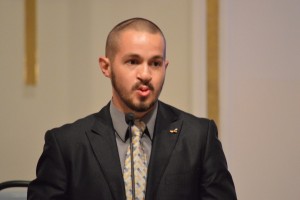 I have been asked to share my burden with you. Normally, for me, it would be very hard to separate my burden from my call. However, they are two very different things. I believe that in reality, the burden is the fuel for the fire that we could define as “the call.” A calling is what Jeremiah expressed in Jeremiah 20:9 when he exclaimed, “Then said I, I will not make mention of Him, nor speak any more in His name. But His Word was in mine heart as a burning fire shut up in my bones, and I was weary with forbearing, and I could not stay.” A calling is something that we must do, and if we are not doing it, we feel that we will die. Everyone has a calling. Some people have a calling to a certain people group like the Chuukese. Some people have a calling to work with bus kids, while other people may have a calling to minister to older folks. Some people are called to the people that they interact with at work. If you are saved and breathing, you have a calling. What is the one thing in your life, right now, that if you stopped doing, life would not be worth the living? That is your call.
I have been asked to share my burden with you. Normally, for me, it would be very hard to separate my burden from my call. However, they are two very different things. I believe that in reality, the burden is the fuel for the fire that we could define as “the call.” A calling is what Jeremiah expressed in Jeremiah 20:9 when he exclaimed, “Then said I, I will not make mention of Him, nor speak any more in His name. But His Word was in mine heart as a burning fire shut up in my bones, and I was weary with forbearing, and I could not stay.” A calling is something that we must do, and if we are not doing it, we feel that we will die. Everyone has a calling. Some people have a calling to a certain people group like the Chuukese. Some people have a calling to work with bus kids, while other people may have a calling to minister to older folks. Some people are called to the people that they interact with at work. If you are saved and breathing, you have a calling. What is the one thing in your life, right now, that if you stopped doing, life would not be worth the living? That is your call.